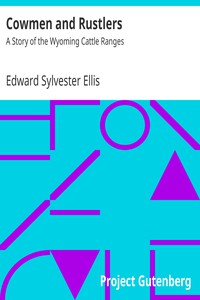Cowmen and Rustlers: A Story of the Wyoming Cattle Ranges by Edward Sylvester Ellis (rosie project txt) 📗

- Author: Edward Sylvester Ellis
Book online «Cowmen and Rustlers: A Story of the Wyoming Cattle Ranges by Edward Sylvester Ellis (rosie project txt) 📗». Author Edward Sylvester Ellis
CHAPTER XXVII. — ON PAROLE.
A new matter of interest claimed the immediate attention of the defenders within the home of ranchman Whitney.
It will be remembered that the sister had reported the approach of a horseman, whom she believed to be her brother. The rider was now in plain sight, and a brief scrutiny through the glass by Hawkridge removed all doubt; she was right.
He was coming at an easy, swinging gallop, straight toward his home. He must have seen the rustlers while yet a considerable way off, for he quickened the pace of his animal, stirred by a natural anxiety for his loved ones and by a curiosity to know the meaning of the strange condition of affairs.
Had he understood matters fully, while yet at a distance, he would have avoided a mistake which occasioned him and his friends intense regret, and which proved irreparable.
He did not cease his advance until within a hundred yards, when the cattlemen, who were watching his every movement, saw him bring his horse to a sudden halt. At the same moment a couple of rustlers moved into view, their guns held so as to cover him. He sat motionless until they came up, one on either side, when he was seen to be conversing earnestly with them.
"They have made him prisoner," remarked Hawkridge, "just as I was sure they would."
"Will they do him harm?" asked Mrs. Whitney, who, with Jennie, had descended the stairs and stood with the group near the front door.
"No," was Hawkridge's reassuring reply; "he must see the uselessness of resistance, and we are not fighting Indians who learned warfare from the late lamented Sitting Bull."
It was noticed that Fred Whitney, despite the wound of a couple of days before, no longer wore his arm in a sling. As he had said, he was ashamed to do so.
Brave as was the young man, he had judgment. He knew that he was at the mercy of a score of rustlers, and quickly learned the situation. Capt. Asbury, Monteith Sterry, Dick Hawkridge and a number of cattlemen were besieged in his home.
While he was holding earnest converse with his captors one of them turned and addressed Inman, who was out of sight of the besieged, because of the intervening ridge. His reply caused Whitney to dismount and walk in that direction, he, too, passing out of the field of vision.
He was invisible for perhaps ten minutes, when he was seen coming over the ridge toward his own door, but without his Winchester or revolvers. A moment later he was admitted. He kissed his mother and sister and grasped the hands of his friends, who crowded around to congratulate him and hear what he had to say.
"They told me everything," he replied, looking into the glowing faces, and smiling at the anxiety depicted on several. "I have made a woeful mistake, boys."
"How's that?" asked several in the same breath.
"Hankinson and Weber have moved several miles further into the mountains, so nothing will be seen of them for several days, and perhaps not for a week. The trouble with the rustlers makes it necessary that we should keep closer watch than usual upon the stock, and it is understood that they are not to leave the cattle until they get word from me. So, as I said, they are out of the question."
"Is that the mistake you refer to?" asked Sterry.
"I wish it was; but a couple of hours ago, Hankinson, who had ridden a considerable distance beyond the grazing grounds, came in with the report that a large body of men were camped in a valley a mile or so further on. There must be fifty at least."
Capt. Asbury emitted a low whistle.
"Rustlers again! By and by we'll have all there are in Wyoming swarming about this house."
"No; Budd visited them, and found they were cattlemen on the hunt for rustlers. Had he known of Inman's party out here he would have given them a pointer, but of course he doesn't dream of anything of the kind. Now, the mistake I made is this: When I saw the horsemen gathered about the buildings and ridge, I ought to have wheeled and ridden as hard as I could to the stockmen. They would have been here before night and wound up this business in a jiffy. But I kept on and rode right into the trap set for me, and can do nothing."
No one could question the justice of Whitney's self-condemnation, but there was no help for it.
"How is it you were allowed





Comments (0)